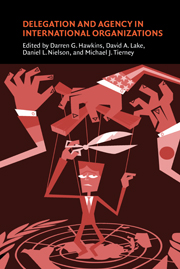Book contents
- Frontmatter
- Contents
- List of figures
- List of tables
- Notes on contributors
- Preface
- Part I Introduction
- Part II Variation in principal preferences, structure, decision rules, and private benefits
- 2 Who delegates? Alternative models of principals in development aid
- 3 US domestic politics and International Monetary Fund policy
- 4 Why multilateralism? Foreign aid and domestic principal-agent problems
- 5 Distribution, information, and delegation to international organizations: the case of IMF conditionality
- 6 Delegation and discretion in the European Union
- Part III Variation in agent preferences, legitimacy, tasks, and permeability
- Part IV Directions for future research
- References
- Index
- Titles in this series
3 - US domestic politics and International Monetary Fund policy
from Part II - Variation in principal preferences, structure, decision rules, and private benefits
Published online by Cambridge University Press: 22 September 2009
- Frontmatter
- Contents
- List of figures
- List of tables
- Notes on contributors
- Preface
- Part I Introduction
- Part II Variation in principal preferences, structure, decision rules, and private benefits
- 2 Who delegates? Alternative models of principals in development aid
- 3 US domestic politics and International Monetary Fund policy
- 4 Why multilateralism? Foreign aid and domestic principal-agent problems
- 5 Distribution, information, and delegation to international organizations: the case of IMF conditionality
- 6 Delegation and discretion in the European Union
- Part III Variation in agent preferences, legitimacy, tasks, and permeability
- Part IV Directions for future research
- References
- Index
- Titles in this series
Summary
INTRODUCTION
Emerging market crises of the 1990s stimulated new interest in the political motivations that shape International Monetary Fund (IMF or Fund) lending decisions. We take up this topic, analyzing the interests and influence of the IMF's most powerful member, the United States. Instead of specifying an aggregate “national interest” for the United States, we ground our approach in domestic politics. One of our arguments is that American “money-center” banks comprise a key constituency for the IMF and lobby on its behalf. US policy-makers, in turn, use their influence at the Fund to ensure that countries in which American banks are highly exposed fall under the IMF's insurance umbrella. In short, we provide microfoundations for IMF lending and identify a possible source of “moral hazard” in the lobbying activities of US banks.
We are not the first to identify money-center banks as an important constituency for the IMF. A radical “dependencista” version of the argument has been around since the 1960s and a more orthodox variant is currently circulating (Barro 1998; Soros 1998; Stiglitz 2002). One claims the existence of a “Wall Street–Treasury complex” (Bhagwati 2002: 8–9). Other studies (Gould 2003; Oatley and Yackee 2004) examine the extent to which commercial banks exert a systematic influence on IMF lending. Still, some fundamental questions remain: How do bankers and other private actors influence an international organization like the IMF? Why would IMF officials be responsive to the interests of private actors?
- Type
- Chapter
- Information
- Delegation and Agency in International Organizations , pp. 77 - 106Publisher: Cambridge University PressPrint publication year: 2006
- 34
- Cited by

